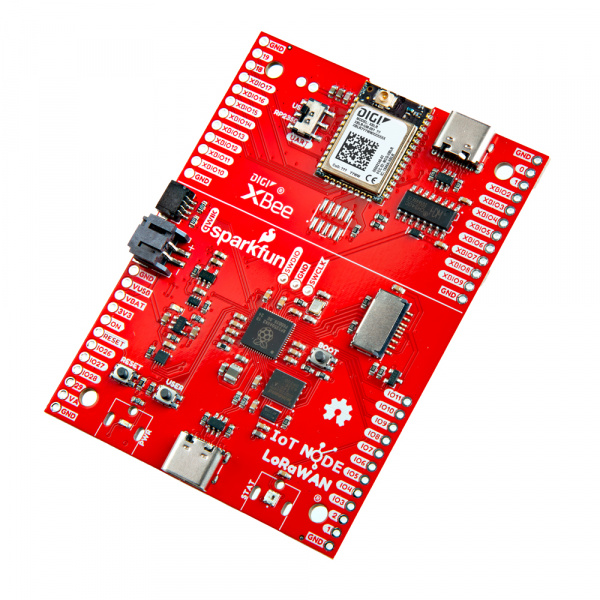SparkFun IoT Node - LoRaWAN (WRL-26060)
The SparkFun IoT Node – LoRaWAN development board brings an entirely new level of usability to the often convoluted and configuration-intensive effort to set up a LoRaWAN™-based IoT Device. Combining the ease of LoRaWAN™ setup and configuration delivered by the Digi X-ON™ system with the rapid prototyping provided by the SparkFun Qwiic ecosystem, the SparkFun IoT Node – LoRaWAN development board accelerates IoT end-node creation and deployment.
Out of the Box
With the integration of Digi X-ON™ technology, the SparkFun IoT Node – LoRaWAN board allows the creation and deployment of a LoRaWAN™ IoT sensor in minutes.
- Set up the Digi HX15 Gateway for LoRaWAN and corresponding Digi account.
- Register the IoT Node – LoRaWAN board quickly using the digital data block on the module.
- Add the antenna and a supported Qwiic sensor to the Node board
- Power the board
The SparkFun IoT Node – LoRaWAN board is shipped with firmware installed that Digi HX15 Gateway for LoRaWAN automatically connects to Digi X-ON, detects an attached sensor, and posts data to the X-ON cloud. Configured via a serial console connection, this application allows rapid evaluation and creation of a LoRaWAN™ IoT device.
The pre-installed application is also open source and readily available, enabling rapid customization if desired.
Firmware Development
The firmware development for the SparkFun IoT Node – LoRaWAN board is performed primarily in the Arduino environment and enabled by an Arduino XBee® LR library from Digi. Combining the easy LoRaWAN™ access provided by the Digi library with the wide range of Qwiic sensors available from SparkFun, the possibilities of potential LoRaWAN™ IoT sensors are endless.
Additionally, the pre-installed application is open source and readily available, enabling rapid customization if desired.
Hardware
At the heart of the IoT Node – LoRaWAN board is the RP2350 microprocessor from Raspberry Pi, supporting many development environments, including Arduino, micropython, and the Raspberry Pi pico SDK. Besides the capabilities the RP2350 provides, we’ve kitted out the processer with all the goodies your project might require:
- 16 MB of flash
- 8 MB PSRAM
- Qwiic connector
- On-board Lithium Ion (LiPo) battery charging
- Fuel gauge circuits
- microSD card
- A variety of IO pins
- RGB LED and user button
The Digi XBee® LR module for LoRaWAN module is directly connected to a serial port of the RP2350, allowing direct control and access to the LoRaWAN™ module via a development library provided by Digi.
The XBee® LR for LoRaWAN™ module is the latest LoRaWAN™ module from Digi, delivering unmatched operational performance and onboarding simplicity. The Digi XBee® LR uses LoRa™ modulation for Non-Line-of-Sight (NLOS) two-way communications for long-range and high-noise RF environments. Since each module is pre-activated on Digi's X-ON™ cloud platform, automated connection and two-way device management are a breeze.
- /Hardware - KiCAD design files (.brd, .sch)
- /Documents - Files related to the hardware on the board
- /docs - Hookup guide files
- Hookup Guide - Basic hookup guide for the SparkFun IoT Node for LoRaWAN®.
- Firmware Guide - Firmware guide for the SparkFun IoT Node for LoRaWAN®.
This product is open source!
Please review the LICENSE.md file for license information.
If you have any questions or concerns on licensing, please contact technical support on our SparkFun forums.
Distributed as-is; no warranty is given.
- Your friends at SparkFun.


